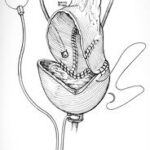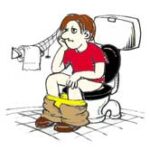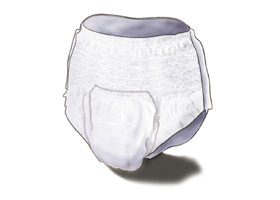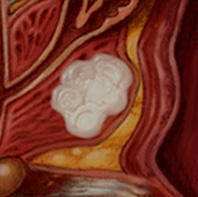 Catheter-associated bacteriuria is the most common healthcare–associated infection worldwide. It’s due to the widespread use of urinary catheterization.
Catheter-associated bacteriuria is the most common healthcare–associated infection worldwide. It’s due to the widespread use of urinary catheterization.
An Expert Panel of the Infectious Diseases Society of America reviewed the evidence and made recommendations to minimize this risk. Here’s what they say about cranberry juice. Continue reading Cranberry juice to prevent catheter-associated urinary tract infection →
 The value of pelvic floor muscle training on the recovery of urinary continence after removing the prostate is controversial, according to researchers at the University of São Paulo School of Medicine, in Brazil.
The value of pelvic floor muscle training on the recovery of urinary continence after removing the prostate is controversial, according to researchers at the University of São Paulo School of Medicine, in Brazil.
They studied biofeedback + pelvic floor muscle training to improve urinary incontinence following radical prostatectomy. Continue reading Biofeedback for men undergoing prostatectomy →
 It’s a rare condition in which urination occurs during laughing. Researchers from North Shore-Long Island Jewish Health System, in New York studied the value of biofeedback in a small group of children. Continue reading Treating giggle incontinence →
It’s a rare condition in which urination occurs during laughing. Researchers from North Shore-Long Island Jewish Health System, in New York studied the value of biofeedback in a small group of children. Continue reading Treating giggle incontinence →
 A diseased urinary bladder with low capacity and low compliance (ability to urinate) may require ileal enterocystoplasty (remove a part of the small intestine and attach it to the bladder to enlarge it and improve function [photo]).
A diseased urinary bladder with low capacity and low compliance (ability to urinate) may require ileal enterocystoplasty (remove a part of the small intestine and attach it to the bladder to enlarge it and improve function [photo]).
Researchers at Hospital Foch, in Suresnes, France, studied a cranberry preparation with high levels of proanthocyanidin A (inhibits bacteria from sticking to tissue) to prevent repeated bacteriuria in people with an ileal enterocystoplasty. Continue reading Effectiveness of cranberry in people with ileal enterocystoplasty →
 During the American Urological Association (AUA) 2010 Annual Scientific Meeting, researchers from the University of Alabama at Birmingham reported that a comprehensive behavioral therapy program is as effective as drug therapy for treating overactive bladder (OAB) in men without significant bladder outlet obstruction. Continue reading Behavioral therapy as good as drugs to treat overactive bladder →
During the American Urological Association (AUA) 2010 Annual Scientific Meeting, researchers from the University of Alabama at Birmingham reported that a comprehensive behavioral therapy program is as effective as drug therapy for treating overactive bladder (OAB) in men without significant bladder outlet obstruction. Continue reading Behavioral therapy as good as drugs to treat overactive bladder →
 Stress incontinence is the involuntary leakage of urine during a physical activity such as coughing or sneezing. It can happen if the pelvic floor muscles are weak.
Stress incontinence is the involuntary leakage of urine during a physical activity such as coughing or sneezing. It can happen if the pelvic floor muscles are weak.
Cochrane has reviewed the data on Kegel exercises in women. Continue reading Pelvic floor training for urinary incontinence →
 Researchers from the VA Medical Center in Minneapolis, Minnesota reviewed treatments for nursing home residents with urinary incontinence.
Researchers from the VA Medical Center in Minneapolis, Minnesota reviewed treatments for nursing home residents with urinary incontinence.
Prompted voiding used alone and combined with exercise were associated with modest short-term improvement in daytime urinary incontinence. Continue reading Prompted voiding for urinary incontinence →
 Obesity correlates with urinary incontinence. Might weight loss be an effective treatment?
Obesity correlates with urinary incontinence. Might weight loss be an effective treatment?
Researchers from across the US decided to find out. Continue reading Lose weight, gain control over incontinence →
 Urinary incontinence can lead to lower self-esteem and even kidney damage.
Urinary incontinence can lead to lower self-esteem and even kidney damage.
Researchers from Hopital Jeanne de Flandre in Lille, France evaluated the effect of a biofeedback-training program in children with a long history of voiding disorders. Continue reading Biofeedback in children with voiding disorders →
 Both methods are effective in patients with urinary stress incontinence, according to this study by researchers at Gaziosmanpasa University in Tokat, Turkey. Continue reading Interferential current vs biofeedback for stress incontinence →
Both methods are effective in patients with urinary stress incontinence, according to this study by researchers at Gaziosmanpasa University in Tokat, Turkey. Continue reading Interferential current vs biofeedback for stress incontinence →
 Radical prostatectomy is an operation to remove the prostate gland and some of the tissue around it. It is done to treat prostate cancer, and up to half of all men who have a radical prostatectomy develop urinary incontinence.
Radical prostatectomy is an operation to remove the prostate gland and some of the tissue around it. It is done to treat prostate cancer, and up to half of all men who have a radical prostatectomy develop urinary incontinence.
Preoperative pelvic floor training (PFT) is used to strengthen the muscles and improve recovery of continence following the operation.
Does adding biofeedback help?
Continue reading Does biofeedback reduce incontinence after prostate surgery? →
Complementary and Alternative Medicine: Fair, Balanced, and to the Point
 Catheter-associated bacteriuria is the most common healthcare–associated infection worldwide. It’s due to the widespread use of urinary catheterization.
Catheter-associated bacteriuria is the most common healthcare–associated infection worldwide. It’s due to the widespread use of urinary catheterization.
 It’s a rare condition in which urination occurs during laughing. Researchers from North Shore-Long Island Jewish Health System, in New York
It’s a rare condition in which urination occurs during laughing. Researchers from North Shore-Long Island Jewish Health System, in New York 

 Stress incontinence is the involuntary leakage of urine during a physical activity such as coughing or sneezing. It can happen if the pelvic floor muscles are weak.
Stress incontinence is the involuntary leakage of urine during a physical activity such as coughing or sneezing. It can happen if the pelvic floor muscles are weak. Researchers from the VA Medical Center in Minneapolis, Minnesota
Researchers from the VA Medical Center in Minneapolis, Minnesota  It’s mostly in your head.
It’s mostly in your head.  Urinary incontinence can lead to lower self-esteem and even kidney damage.
Urinary incontinence can lead to lower self-esteem and even kidney damage. Both methods are effective in patients with urinary stress incontinence, according to this
Both methods are effective in patients with urinary stress incontinence, according to this  Radical
Radical